Shell hosts ‘Shell Forum 2022’ to emphasise its ongoing commitment to clean energy, combining forces with all sectors to contribute to Thailand's transition toward a sustainable low-carbon society
Aug 18, 2022
Bangkok, Thailand - The Shell Company of Thailand Limited, in collaboration with experts from the government and private sectors, organized an insightful platform to discuss and exchange ideason the future trends that will propel the country toward a low-carbon society at ‘Shell Forum 2022’. The forum, under the theme ‘Decarbonization: The Journey Towards a Low-Carbon Economy’, aims to serve as a venue for idea gatherings and collaborations from all sectors to contribute to Thailand's transition toward a sustainable low-carbon society.
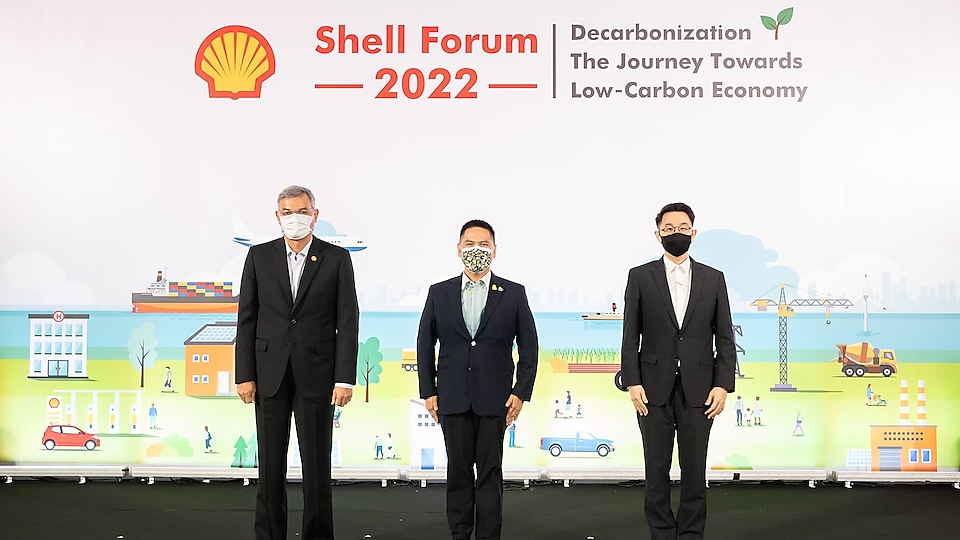
(From left to right) Mr. Panun Prachuabmoh, Country Chairman, The Shell Company of Thailand Limited; Mr. Varawut Silpa-archa, Minister of Natural Resources and Environment; Prof. Dr. Pisut Painmanakul, Secretary to the Minister of Energy, at Shell Forum 2022.
Mr. Varawut Silpa-archa, Minister of Natural Resources and Environment, opened the first session of the event, under the theme The Thought Leaders’, by addressing ‘Thailand's Climate Commitment and Decarbonization Journey’: “Thailand is one of the top ten countries in the world in terms of climate change impact, although we emit only 0.8% of greenhouse gases. Because livestock and agriculture are the primary sources of our emissions, the government has established pilot rice-growing regions in Suphan Buri to explore effective water management strategies. As a result, methane emissions were reduced by 70% while increasing produce yield by 800 kilograms per rai (1,600 m2).
Furthermore, we have implemented the Bio-Circular-Green Economy (BCG) policy to achieve our goals of becoming Carbon Neutral by 2050 and Net-Zero Emissions by 2065 by focusing on six areas: policy, CCS (Carbon Capture and Storage) technology, investment, the development of a carbon credit market mechanism, increased greenhouse gas storage and re-absorption, and legal aspects. The Agri-Tech with Roots (ATR) concept has been embraced in the agricultural industry by combining technology with local wisdom.
In addition, wealso have approximately 11,000 community forests, which are considered important resources for the Thai economy. Furthermore, in accordance with the 20-Year National Strategy, the government intends to enhance green space in Thailand by 55%. The Ministry of Natural Resources and Environment has already established guidelines and mechanisms for carbon credit management that encourage ongoing and sustainable collaboration across the government, private, and public sectors.”
Prof. Dr. Pisut Painmanakul, Secretary to the Minister of Energy, delivered a lecture entitled ‘Thailand's Decarbonization Policy in the Energy Sector: Opportunities and Challenges’: "Today, the energy sector is responsible for 71% of greenhouse gas emissions, followed by agriculture, manufacturing, and waste management. The 4Ps, which are Profit, People, Planet, and Partnership, are the four fundamental forces, driving the transition to a low-carbon economy. The Ministry of Energy has developed a National Energy Policy, which aims at achieving a low-carbon economy and being Carbon Neutral by 2050, with the goals of (1) using more than 50% renewable energy (with a good energy storage system);
(2) the 30@30 Policy, which states that by 2030, zero-emission vehicles must account for at least 30% of total vehicle production; (3) increasing energy efficiency; and (4) implementing the 4D1E policy (Digitalization, Decarbonization, Decentralization, Deregulation, and Electrification) into action. Together with the BCG Model, the government has boosted its investment in renewable energy.
We believe that modifying Thailand’senergy policy and transitioning to a low-carbon economy, can improve economic value, Thai businesses’ competitiveness, investment, and employment, while lowering PM 2.5 pollution, and rebuilding the Thai economy in a sustainable way following the epidemic.”
Mr. Panun Prachuabmoh, Country Chairman, The Shell Company of Thailand Limited, said: “As a result of global warming, climate change is becoming a concern that affects all industries. In 2020, Shell unveiled the ‘Powering Progress’ strategy to accelerate the transition to a net-zero emissions energy business, with four corepillars: (1) Net-Zero Emissions: Shell's target s to reduce Scope 1 and Scope 2 greenhouse gas emissions by 50% by 2030 and achieve net-zero emissions by 2050; (2) Powering Lives: Shell's commitment to providing quality, reliable, and sustainable energy; (3) Respecting Nature: Environmental preservation, waste reduction and management, as well as active participation in biodiversity development; and (4) Generating Shareholder Value: In order to achieve all of its goals, Shell must establish financial strength to fund the investments that support the path to a low-carbon economy.
Beyond our commitment to providing energy to meet our customers' needs, Shell recognizes the importance of striking a balance between various elements in quality, product diversity, sustainability, and the environment by developing quality products and services such as the use of fuels containing biological materials, carbon-neutral lubricant distribution, asphalt products (e.g. Bitumen Fresh Air) that help reduce greenhouse gas emissions into the atmosphere, and the installation of EV charging stations in collaboration with leading car brands, as well as the initiation of nature-based solutions.
Based on our experience working with numerous industries, including Shell's regional teams, we believe the following operations will be critical to Thailand's net-zero emissions goal,: (1) In order to address global warming challenges in a sustainable manner, we must prioritize avoiding and reducing greenhouse gas emissions by using low-carbon energy, implementing renewable energy such as electric, wind, and solar power, and carbon compensation. (2) Sustainable carbon reduction management must be performed at both speed and scale (2.1) the worldwide carbon credit registration standard;
(2.2) the domestic and international carbon credit trading markets; (2.3) the carbon tax system or ETS (Emission Trading System), which is utilised for greenhouse gas reduction research, supporting carbon reduction enterprise investment, and assisting those affected by natural disasters. (4) Promoting technological transfer and the aforementioned investment. (5) For the agricultural sector, in addition to reforestation, research into water-use efficiency in rice production and carbon farming for smallholder farmers.
Another highlight of Shell Forum 2022 was ‘The Change Makers’ session, which featured a conversation on the theme ‘All Roads Lead to Decarbonization’, with professionals from diverse industries sharing carbon reduction techniques. Dr. Jain Charnnarong, President of the Ananda Mahidol Scholarship Foundation, shared the foundation's role in a study of wildfires in Mae Ping, Omkoi, and Mae Tuen District, in Chiang Mai province, with 16 billion m2 of repeated land burning and about 10 billion m2 of forest that causes PM 2.5 pollution due to a lack of knowledge and understanding in farming and biological waste management. This may be addressed by educating local inhabitants and authorities about natural and environmental systems that will aid the reduction of carbon in the area.
Meanwhile, Ms. Sopacha Dhumrongpiyawut, CEO of Gunkul Engineering plc, a private sector representative, is committed to providing technologies to assist the reduction of carbon emissions in sustainable energy production by increasing the amount of clean energy production in the power grid. Gunkul Engineering plc aims to generate 1,000 MW of electricity from wind and solar energy by 2024, emphasizing that Thailand can drive towards green energy through a combination of investment in technology, government regulation relief, digital ecosystem support, and investment support.
Assist Prof. Yossapong Laoonual, Assistant to the President for Sustainability Development at King Mongkut’s University of Technology Thonburi and Honorary President of the Electric Vehicle Association of Thailand (EVAT), discussed current trends in electric vehicles, which the public perceives as a significant reduction in carbon emissions on the roads. However, when all processes are included, the EV production process still produces more carbon than combustion engine cars, demanding further technological breakthroughs . Local SME entrepreneurs, on the other hand, can develop further if they are encouraged , which is immensely dependent on the government’s regulations and subsidies. The academic sector can also support the industry through research and development, while the private sector can contribute by developing new products and raising public awareness
Ms. Aminta Permpoonwiwat, Thailand's delegate at Youth4Climate in Italy in September 2021, expressed interest in promoting sustainability education and awarenessamong underprivileged youth. She established the Youth Mentorship Project to bridge socioeconomic disparities as well as to empower and raise awareness about climate change, allowing everyone to work together to address this issue in a sustainable manner.
At the event's conclusion, businesses and organizations that have had significant impacts presented their insights under the topic ‘The Transformers’. Mr. Kazeem Khan, General Manager of Shell Asia-Pacific Nature-based Solutions, began by discussing Shell's achievement of carbon emissions reduction through reliance on nature and ecosystems so that nature can help absorb carbon dioxide, preventing greenhouse gas emissions, and balancing the surrounding ecosystem. Thailand offers natural areas that might assist carbon storage, which could be improved through mangrove conservation and restoration (Blue Carbon), forest fire control, managed agriculture or agroforestry.
Mr. Kiatchai Maitriwong, Executive Director of the Thailand Greenhouse Gas Management Organization, discussed Thailand's proposed greenhouse gas reduction ambition (as part of the global community) to reduce greenhouse gas emissions by 40% by 2030 and become a carbon-neutral society by 2050, and achieve net-zero greenhouse gas emissions by 2065. In order to achieve the goals in each phase, the situation was described. For Thailand, approach to decreasing greenhouse gas emissions is a voluntary carbon market. Currently, there are around 100 registered enterprises. The company is committed to elevating the standard of the country's greenhouse gas reduction programme and assisting Thailand in becoming an ASEAN carbon credit trading hub . Therefore, in order to support Thailand in becoming carbon neutral, it established the Carbon Neutral Network (which currently has 256 members) through the collaboration of leading climate action organizations and climate action innovators. Thailand Carbon Credit Exchange facilitates the exchange of carbon credits Because the cost of reducing greenhouse gas emission varies bymeasure , the price must be established at an acceptable rate. Furthermore, the organization intends to improve the Thailand Voluntary Emission Reduction Programme (T-VER) in order to propel Thailands’s carbon market towards its goals.
Finally, Mr. Andrew Howard, Senior Director in Climate Policy and Strategy at Verra, a non-profit environmental organization based in the USA, addressed carbon credit and carbon markets on a global scale, recommending the establishment of carbon markets in collaboration with standardized entities. The government should begin by setting objectives for reducing carbon emissions and defining how to achieve them in the country, and then help other projects.
Since 2018, Shell Thailand has hosted the Shell Forum to foster collaboration among the government, corporate, and public sectors. It aims to serve as a forum for dialogue and the formation of action coalitions in order to raise public awareness on the impact of greenhouse gas emissions from both the private and public sectors, as well as to encourage all sectors to collaborate in order to contribute to Thailand's low-carbon society in a consistent and sustainable manner.
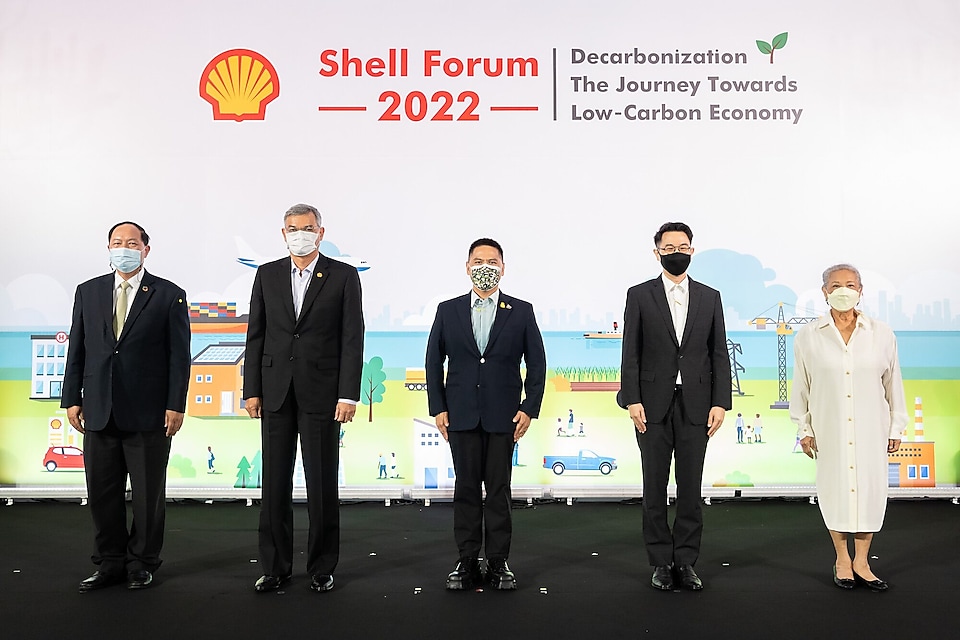
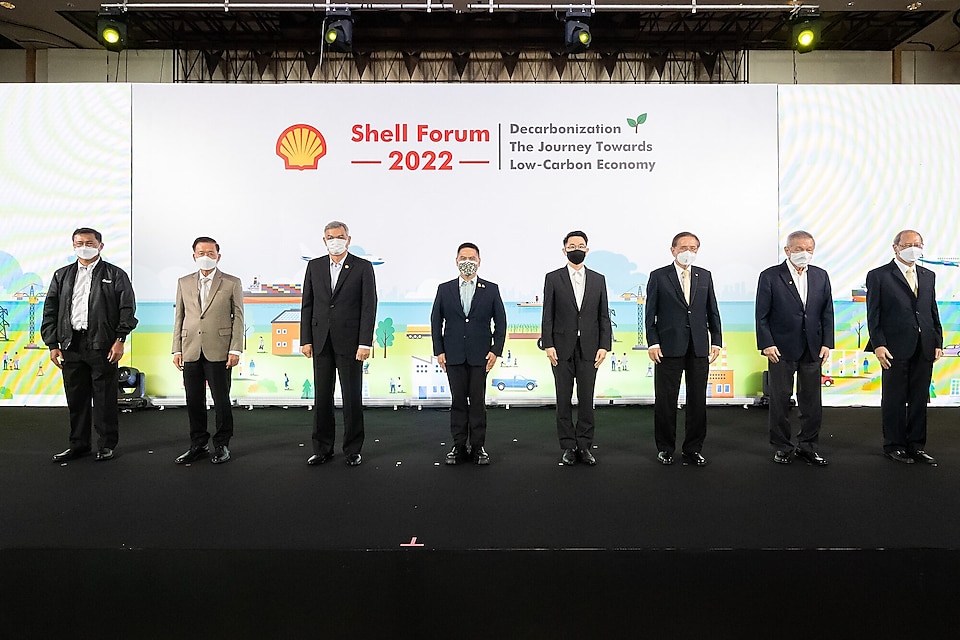
Mr. Panun Prachuabmoh, Country Chairman, The Shell Company of Thailand Limited; Mr. Varawut Silpa-archa, Minister of Natural Resources and Environment; Prof. Pisut Painmanakul, Secretary to the Minister of Energy; and Thailand’s business leaders attending the Shell Forum 2022.
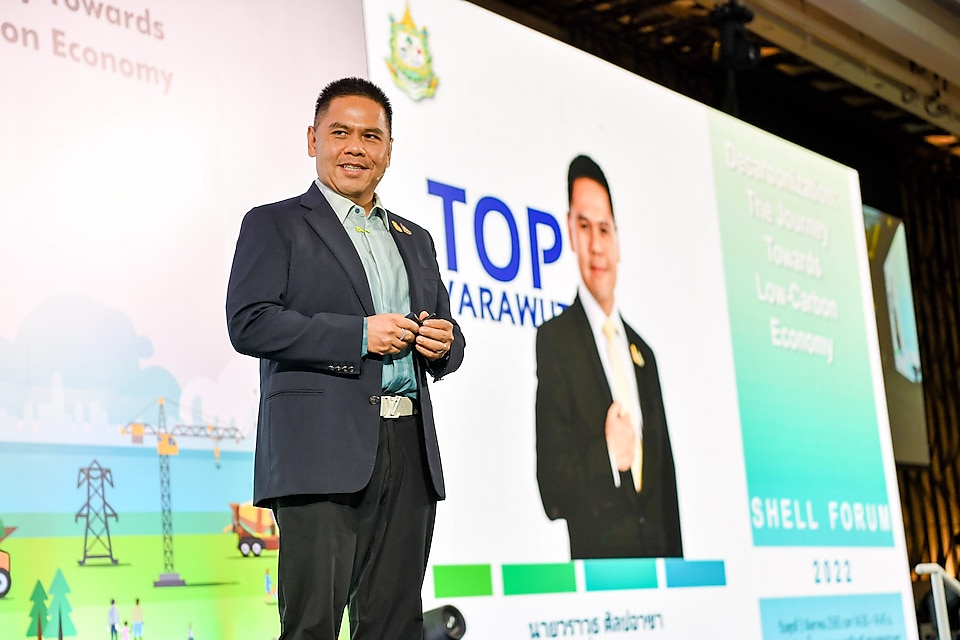
Mr. Varawut Silpa-archa, Minister of Natural Resources and Environment, shared his vision on the topic ‘Thailand's Climate Commitment and Decarbonization Journey’.
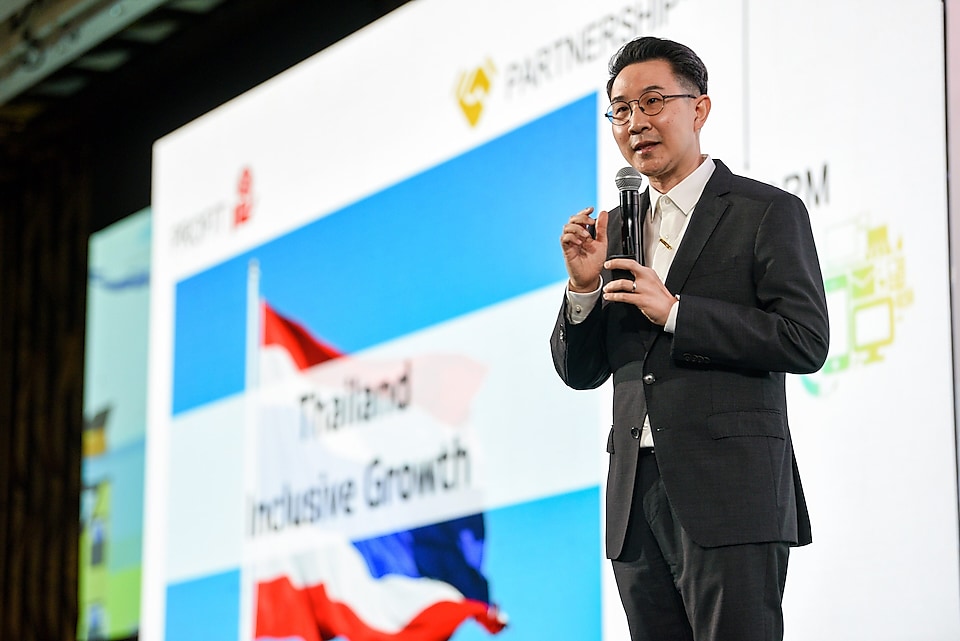
Prof. Dr. Pisut Painmanakul, Secretary to the Minister of Energy, rendered a speech entitled ‘Thailand's Decarbonization Policy in the Energy Sector’.
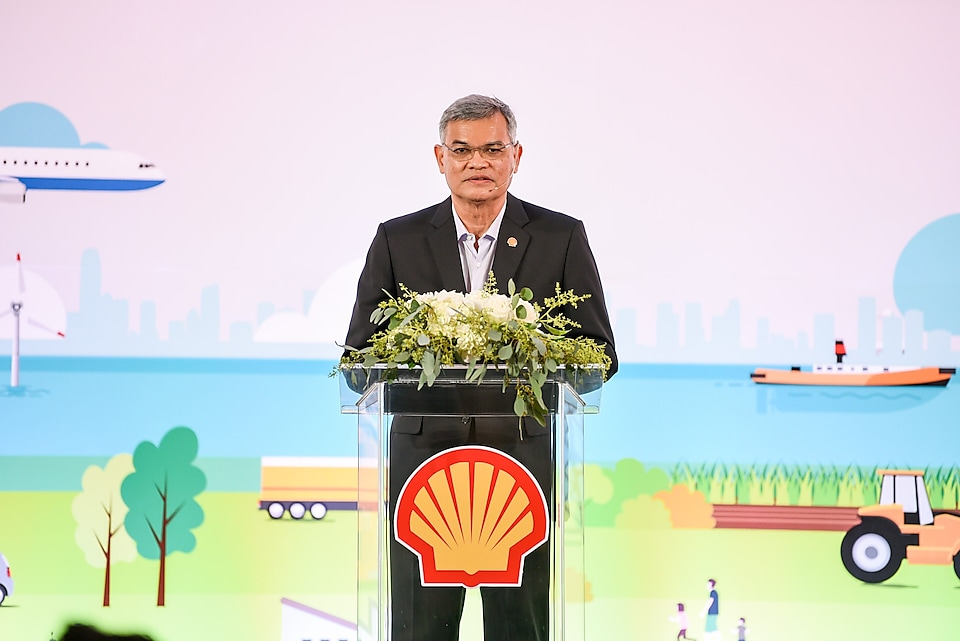
Mr. Panun Prachuabmoh, Country Chairman, The Shell Company of Thailand Limited.
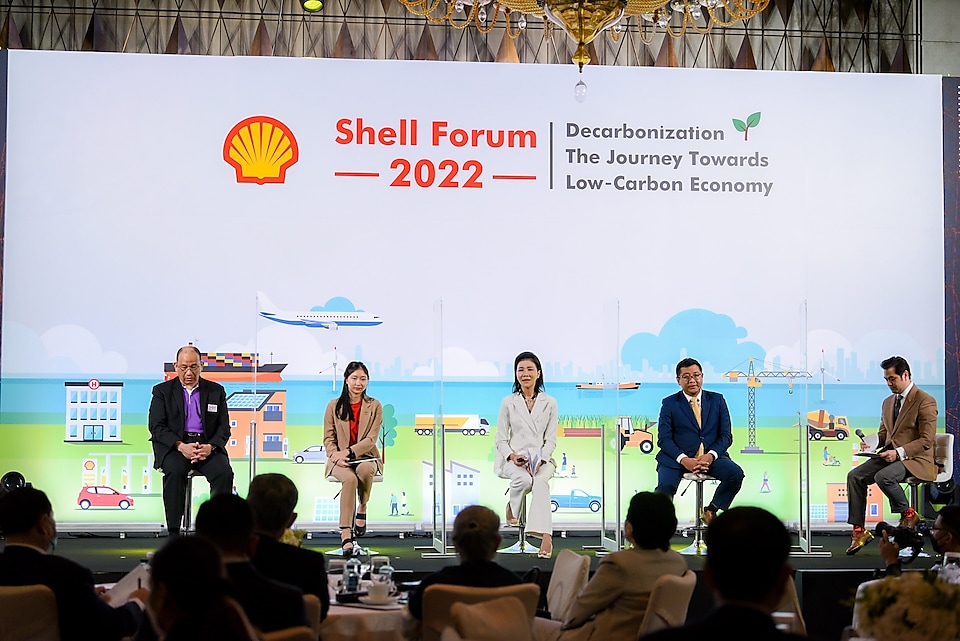
The discussion on the ‘All Roads Lead to Decarbonization’ topic was discussed by Dr. Jain Charnnarong, President of the Ananda Mahidol Scholarship Foundation; Ms. Sopacha Dhumrongpiyawut, CEO of Gunkul Engineering plc; Assist Prof. Yossapong Laoonual, Assistant to the President for Sustainability Development, King Mongkut’s University of Technology Thonburi and Honorary President of the Electric Vehicle Association of Thailand (EVAT); and Ms. Aminta Permpoonwiwat, Thailand's representative at Youth4Climate in Italy.
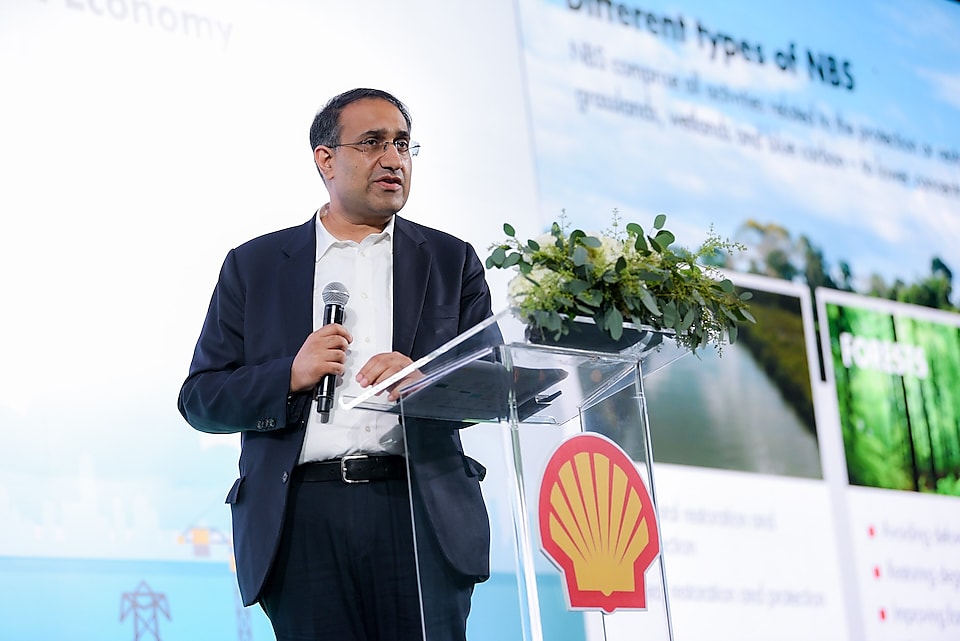
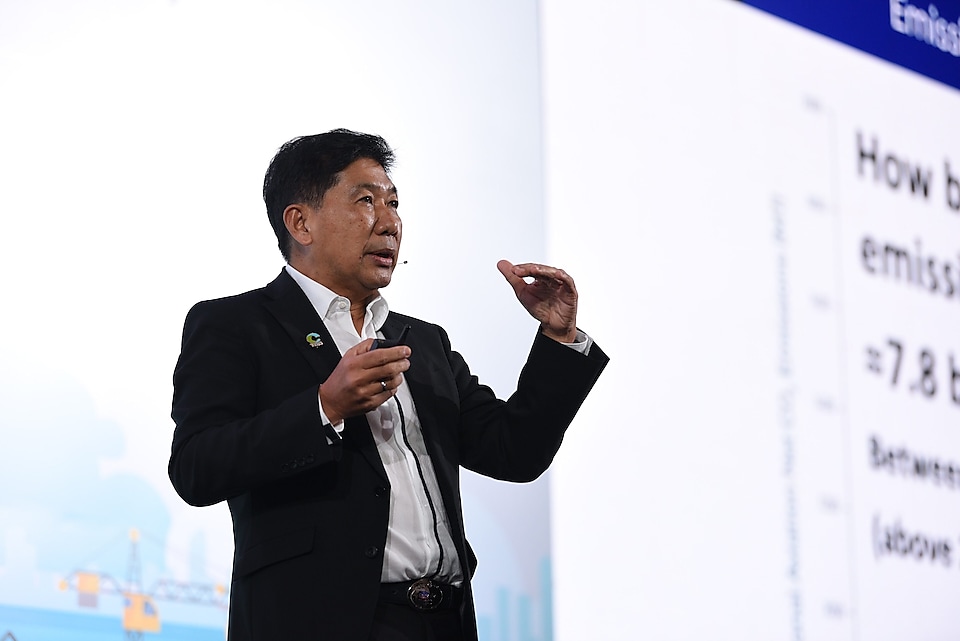
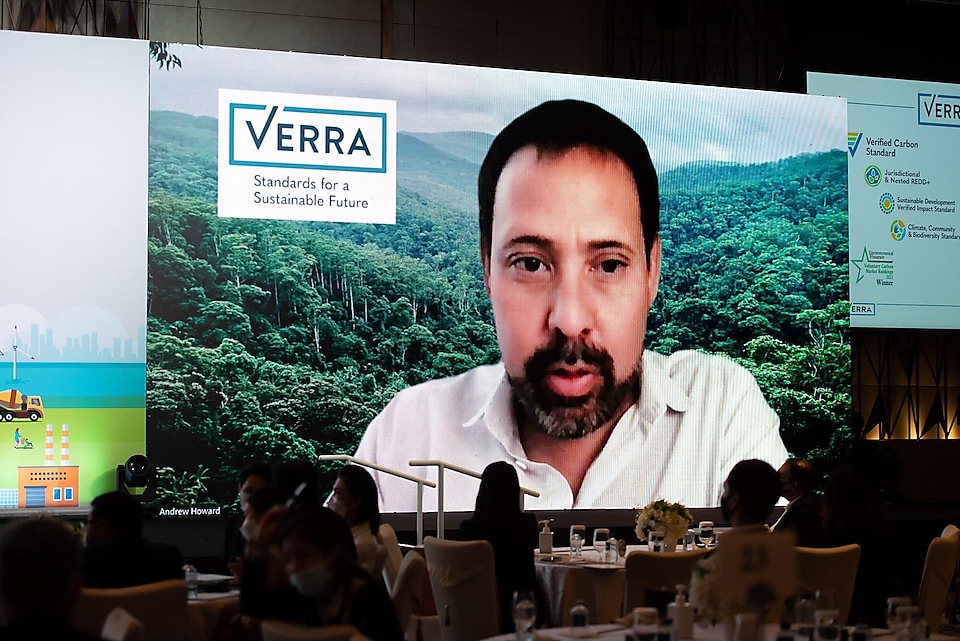
The discussion in ‘The Transformers’ session was led by Mr. Kazeem Khan, General Manager of Shell Asia-Pacific Nature-based Solutions; Mr. Kiatchai Maitriwong, Executive Director of Thailand Greenhouse Gas Management Organization; and Mr. Andrew Howard, Senior Director in Climate Policy and Strategy of Verra.
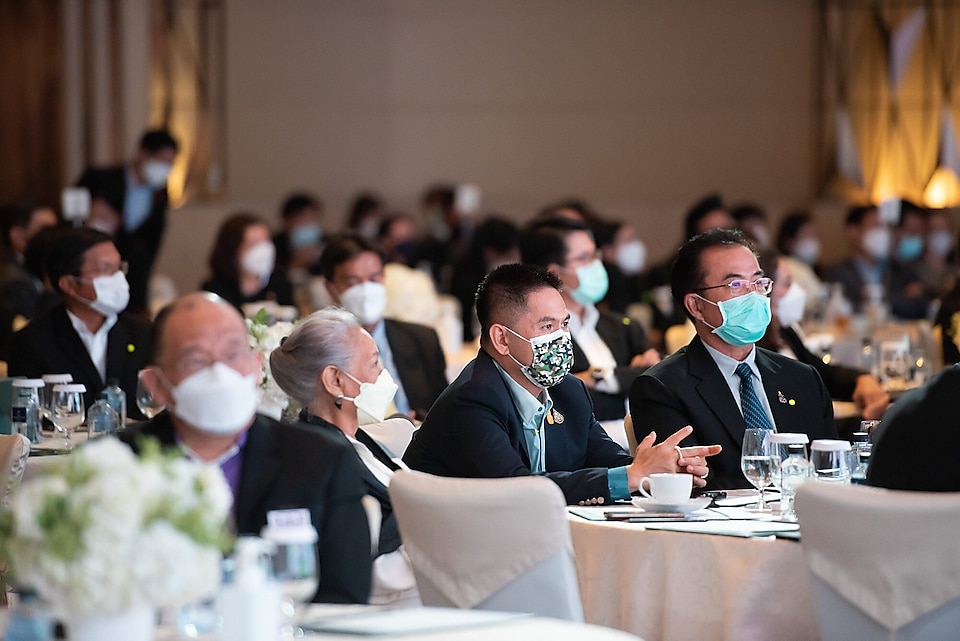
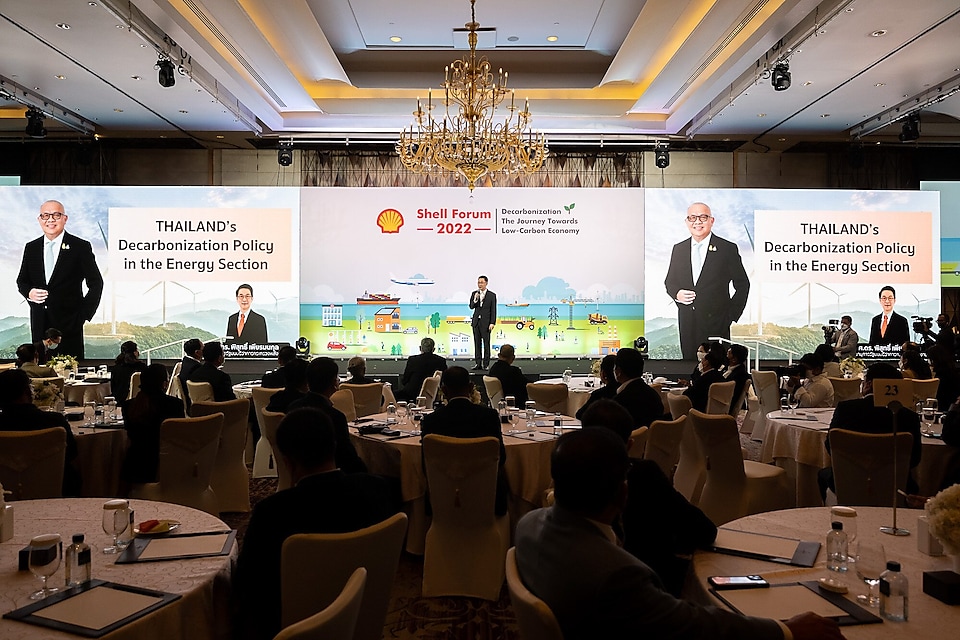
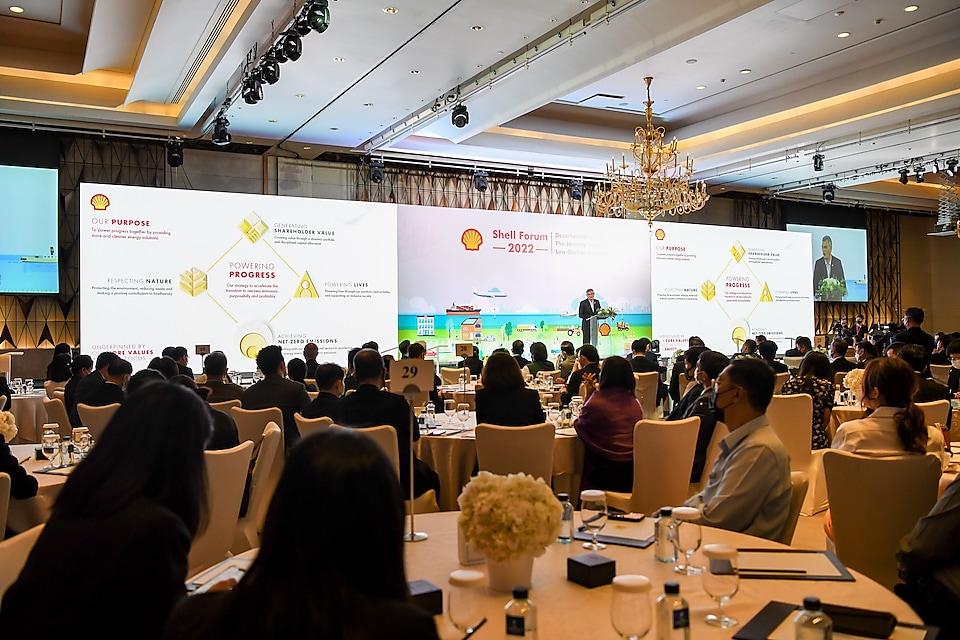
Shell Forum 2022
For Media Enquiries:
Sudarat Peetakanont
Corporate Relations Advisor
Corporate Relations
The Shell Company of Thailand Limited
M +66 2 262 7839
E sudarat.peetakanont@shell.com
Kaewta Ketbungkan
H+K Strategies Thailand
E hkshellthailand@hkstrategies.com
Cautionary note
The companies in which Shell plc directly and indirectly owns investments are separate legal entities. In this announcement, “Shell”, “Shell Group” and “Group” are sometimes used for convenience where references are made to Shell plc and its subsidiaries in general. Likewise, the words “we”, “us” and “our” are also used to refer to Shell plc and its subsidiaries in general or to those who work for them. These terms are also used where no useful purpose is served by identifying the particular entity or entities. ‘‘Subsidiaries’’, “Shell subsidiaries” and “Shell companies” as used in this announcement refer to entities over which Shell plc either directly or indirectly has control. Entities and unincorporated arrangements over which Shell has joint control are generally referred to as “joint ventures” and “joint operations”, respectively. “Joint ventures” and “joint operations” are collectively referred to as “joint arrangements”. Entities over which Shell has significant influence but neither control nor joint control are referred to as “associates”. The term “Shell interest” is used for convenience to indicate the direct and/or indirect ownership interest held by Shell in an entity or unincorporated joint arrangement, after exclusion of all third-party interest.
Forward-Looking Statements
This announcement contains forward-looking statements (within the meaning of the U.S. Private Securities Litigation Reform Act of 1995) concerning the financial condition, results of operations and businesses of Shell. All statements other than statements of historical fact are, or may be deemed to be, forward-looking statements. Forward-looking statements are statements of future expectations that are based on management’s current expectations and assumptions and involve known and unknown risks and uncertainties that could cause actual results, performance or events to differ materially from those expressed or implied in these statements. Forward-looking statements include, among other things, statements concerning the potential exposure of Shell to market risks and statements expressing management’s expectations, beliefs, estimates, forecasts, projections and assumptions. These forward-looking statements are identified by their use of terms and phrases such as “aim”, “ambition”, ‘‘anticipate’’, ‘‘believe’’, ‘‘could’’, ‘‘estimate’’, ‘‘expect’’, ‘‘goals’’, ‘‘intend’’, ‘‘may’’, “milestones”, ‘‘objectives’’, ‘‘outlook’’, ‘‘plan’’, ‘‘probably’’, ‘‘project’’, ‘‘risks’’, “schedule”, ‘‘seek’’, ‘‘should’’, ‘‘target’’, ‘‘will’’ and similar terms and phrases. There are a number of factors that could affect the future operations of Shell and could cause those results to differ materially from those expressed in the forward-looking statements included in this announcement, including (without limitation): (a) price fluctuations in crude oil and natural gas; (b) changes in demand for Shell’s products; (c) currency fluctuations; (d) drilling and production results; (e) reserves estimates; (f) loss of market share and industry competition; (g) environmental and physical risks; (h) risks associated with the identification of suitable potential acquisition properties and targets, and successful negotiation and completion of such transactions; (i) the risk of doing business in developing countries and countries subject to international sanctions; (j) legislative, judicial, fiscal and regulatory developments including regulatory measures addressing climate change; (k) economic and financial market conditions in various countries and regions; (l) political risks, including the risks of expropriation and renegotiation of the terms of contracts with governmental entities, delays or advancements in the approval of projects and delays in the reimbursement for shared costs; (m) risks associated with the impact of pandemics, such as the COVID-19 (coronavirus) outbreak; and (n) changes in trading conditions. No assurance is provided that future dividend payments will match or exceed previous dividend payments. All forward-looking statements contained in this announcement are expressly qualified in their entirety by the cautionary statements contained or referred to in this section. Readers should not place undue reliance on forward-looking statements. Additional risk factors that may affect future results are contained in Shell plc’s Form 20-F for the year ended December 31, 2021 (available at www.shell.com/investor and www.sec.gov). These risk factors also expressly qualify all forward-looking statements contained in this announcement and should be considered by the reader. Each forward-looking statement speaks only as of the date of this announcement, August 18, 2022. Neither Shell plc nor any of its subsidiaries undertake any obligation to publicly update or revise any forward-looking statement as a result of new information, future events or other information. In light of these risks, results could differ materially from those stated, implied or inferred from the forward-looking statements contained in this announcement.
Shell’s net carbon footprint
Also, in this announcement we may refer to Shell’s “Net Carbon Footprint” or “Net Carbon Intensity”, which include Shell’s carbon emissions from the production of our energy products, our suppliers’ carbon emissions in supplying energy for that production and our customers’ carbon emissions associated with their use of the energy products we sell. Shell only controls its own emissions. The use of the term Shell’s “Net Carbon Footprint” or “Net Carbon Intensity” are for convenience only and not intended to suggest these emissions are those of Shell plc or its subsidiaries.
Shell’s net-Zero Emissions Target
Shell’s operating plan, outlook and budgets are forecasted for a ten-year period and are updated every year. They reflect the current economic environment and what we can reasonably expect to see over the next ten years. Accordingly, they reflect our Scope 1, Scope 2 and Net Carbon Footprint (NCF) targets over the next ten years. However, Shell’s operating plans cannot reflect our 2050 net-zero emissions target and 2035 NCF target, as these targets are currently outside our planning period. In the future, as society moves towards net-zero emissions, we expect Shell’s operating plans to reflect this movement. However, if society is not net zero in 2050, as of today, there would be significant risk that Shell may not meet this target.
Forward Looking Non-GAAP measures
This announcement may contain certain forward-looking non-GAAP measures such as cash capital expenditure and divestments. We are unable to provide a reconciliation of these forward-looking Non-GAAP measures to the most comparable GAAP financial measures because certain information needed to reconcile those Non-GAAP measures to the most comparable GAAP financial measures is dependent on future events some of which are outside the control of Shell, such as oil and gas prices, interest rates and exchange rates. Moreover, estimating such GAAP measures with the required precision necessary to provide a meaningful reconciliation is extremely difficult and could not be accomplished without unreasonable effort. Non-GAAP measures in respect of future periods which cannot be reconciled to the most comparable GAAP financial measure are calculated in a manner which is consistent with the accounting policies applied in Shell plc’s consolidated financial statements.
The contents of websites referred to in this announcement do not form part of this announcement.
We may have used certain terms, such as resources, in this announcement that the United States Securities and Exchange Commission (SEC) strictly prohibits us from including in our filings with the SEC. Investors are urged to consider closely the disclosure in our Form 20-F, File No 1-32575, available on the SEC website www.sec.gov.